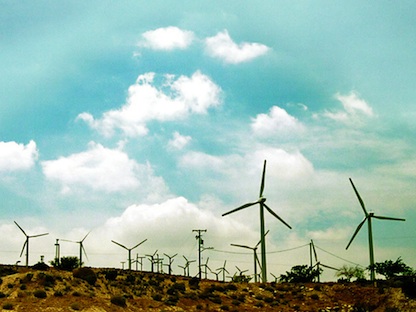After Long Wait, Environmentalists Look for Victory in Bingaman Energy Standard
Renewable energy advocates and environmentalists praised the announcement, while noting that the renewable energy standard, or RES, is not stringent enough.
Jul 31, 20208.7K Shares439.6K Views
Sens. Jeff Bingaman (D-N.M.) and Sam Brownback (R-Kan.) unveiled a proposal Tuesday to increase use of renewable energy. (Flickr, Auntie K)
A bipartisan coalition of senators today unveiled a proposal that would require a certain percentage of the country’s electricity to come from renewable sources like wind and solar. The announcement revived hopes that the measure could move this year, but it remains unclear if there is enough time or political will in the Senate to pass the legislation this session.
Senate Majority Leader Harry Reid (D-Nev.) has not committed to setting aside floor time for the proposal this year. And the bill’s author, Sen. Jeff Bingaman (D-N.M.), told reporters today that he would wait to cement the necessary votes before approaching Reid to schedule a vote.
Renewable energy advocates and environmentalists praised the announcement, while noting that the renewable energy standard, or RES, is not stringent enough. The last six months have been difficult for environmentalists, who faced a string of legislative defeats — first on economy-wide cap-and-trade, then on a narrow cap-and-trade bill. And now there are legitimate questionsabout whether the Senate will be able to pass a slimmed-down energy bill or an oil spill response bill, even after the mid-term elections.
So the RES announcement was, for many environmentalists, a welcome respite from months of disappointment. Sean Garren, clean energy advocate at Environment America, said, “Senator Bingaman’s renewable electricity standard would commit America to beginning the move towards a clean energy economy. While the standard is weaker than America can and should achieve, the Senate must pass the bill quickly to deliver to the entire country the benefits that states with standards are already enjoying.”
The bill, which is sponsored by Bingaman and Sam Brownback (R-Kans.), has early support from a number of Democrats, including Sen. Byron Dorgan (N.D.), Tom Udall (D-N.M.) and Mark Udall (D-Colo.). Two other Republicans, Sens. Susan Collins (Maine) and John Ensign (Nev.), also lent their support to the proposal.
The proposal, which is nearly identical to a provision in an energy bill passed by Bingaman’s Senate Energy and Natural Resources Committee last year, requires that 15 percent of the country’s electricity comes from renewable sources by 2021. Entities can meet the standard by producing or purchasing renewable energy like wind, solar, biomass and some hydropower. They can also meet the standard through energy efficiency savings. The RES will not affect state programs, many of which are more stringent than the federal proposal, according to a summaryof the bill.
But a 2009 analysis of a similar RES proposal by the National Renewable Energy Laboratory, a research arm of the Department of Energy, found that it likely won’tincrease renewable energy development beyond a business-as-usual scenario. The analysis is based on Bingaman’s original 20 percent by 2021 RES proposal, which was cut down to 15 percent to win support from Republicans on the committee.
Bingaman said he believes he has the 60 votes necessary to pass the new RES bill. “I think that the votes are present in the Senate to pass a renewable electricity standard,” he said in a statement. “I think that they are present in the House. I think that we need to get on with figuring out what we can pass and move forward.”
Franz Matzner, climate center legislative director at the Natural Resources Defense Council, says the RES proposal “doesn’t deliver the goods the way we’d like to see it.” The bill is a “band aid” measure, he says, arguing that the Senate needs to move on comprehensive climate change legislation. But Matzner says, “If this is the best place we can get bipartisan agreement, it’s better than getting nothing done.”
It’s too early to say whether the bill will be able to pass the Senate this year. There are very few legislative days left before the Senate breaks for the mid-term elections, and it’s unclear how long a lame-duck session might be. “They could have an eight-hour lame-duck session or they could have a productive two weeks or they could sit and do nothing,” Matzner says.
Reid’s spokeswoman, Regan Lachapelle, notes there is very little time left in the year to pass the RES bill. “Senator Reid strongly supports a national renewable electricity standard,” LaChapelle says. “But, there is very limited time before the October recess and probably even during the lame duck, so the proponents of a stand-alone RES will need to demonstrate they have 60 votes for swift floor action before floor consideration could be scheduled.”
One environmentalist — who has been closely following the issue but is not authorized to speak on the record — said passage of the RES could be dependent on whether it moves as a stand-alone measure or is packaged together with other provisions. At the same time, the environmentalist says, much will depend on the outcome of the mid-term elections. “The bigger the Republican success on election day, the less likely anything will be accomplished during the lame duck session,” the environmentalist says.
Many environmentalists have called for a 25 percent RES by 2025, but before the August recess a coalition of renewable energy advocates endorsed the Bingaman 15 percent RES, noting that it was the only proposal that could win bipartisan support. “In this political climate, we have to do what we have to do,” American Wind Energy Association President Denise Bode told reporters in July.

Hajra Shannon
Reviewer
Latest Articles
Popular Articles
